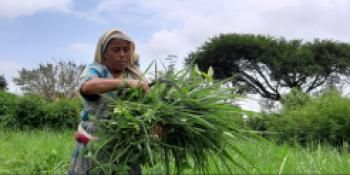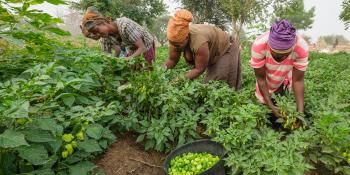Gender attitudes and practices investigated in Bangladesh

“Why should we bother with gender and equality within the science of poverty reduction and improved nutrition?” asked Doug Beare during a session at the Conference on Climate Smart Agriculture in Davis, California. The special session discussed ways to increase the likelihood that research will influence changes in policies, institutions and technologies.
The answer is right in front of us. We should bother because evidence shows that by increasing female ‘agency’, food production can increase, which in turn leads to better nutritional and health outcomes. Therefore, tackling gender, social injustice and related barriers can have a profound impact on the society as a whole, Doug continued.
People need to understand the importance of gender and be willing to create capacity and competencies, and recognize that gender, does in fact matter.
So where do we go from this conviction? Doug emphasized, that what we now need is to think about how to make sure gender analysis is included in the research we conduct, and also what the challenges around this will be.
Bringing gender into poverty and nutrition research has many benefits, where productivity, as mentioned above, is one. But it also give us insights that we might have lost otherwise, insights that could affect health, children's development and education.
Doug gave an example of the “Nobo Jibon”, a five-year project in which WorldFish is involved through building capacity among the participants. Since food security is highly related to fish in the Barisal Division of Bangladesh, the expansion of adaptive small‐scale aquaculture is seen as an important means of providing employment opportunities for the poor, especially women. Expanding small-scale aquaculture farms can therefore help achieve food security and reduce the incidence of malnutrition in children. The project aims to reduce food insecurity and livelihood vulnerability in the area, as well as assess gender attitudes and practices.
The idea of the Nobo Jibon approach is to use the information gained from surveys, to find ways to influence outcomes in a more subtle, rather than direct, way. Understanding the gendered division of work roles and responsibilities is a standard part of gender analysis.
Participants were divided on family type - living with or without a mother-in-law - and were asked a whole range of questions related to nutrition, health, children etc. The recommendations, after analyzing the results, stressed a ‘holistic’ nature of the problem. Even if many seemed to have very limited knowledge on nutrition, i.e. how long should a woman breastfeed for before introducing solids, the husbands and the mothers-in-laws knew less than the wives themselves. This leads to insights on realistic activities to tackle the problems, i.e. providing nutrition education to mums without supporting a gender strategy to raise their own decision-making status will less likely have an impact.
View Doug Beare’s presentation from the session:
The culturally held belief in Bangladesh, that decisions should be made jointly, can in fact form a positive starting point for encouraging more equal decision-making participation on questions of financial and savings management. Appealing to other parts of their identity — their role as mothers — can help mothers ask for things that they themselves desire like better nutrition and rest, more control over household decisions, for the sake of their children.
The report also clearly shows that Nobo Jibon should take special effort to work with women from joint families, where the mother-in-law still lives with the family, where women have less decision-making influence and where tolerance of violence is far greater than in nuclear families.
These are only a few of the insights from analysing gender relations in the Nobo Jibon project. Making sure gender is considered in development projects is important in order for it to have a real impact on everyone involved.
The CGIAR Research Program on Climate Change, Agriculture and Food Security (CCAFS) is funding two WorldFish projects in the Bangladesh delta landscape that are taking transformative approaches that directly address gender issues: Cage Aquaculture and The Smart Farm.
Read related stories from the special session on "Linking Knowledge with Action":
Turning research into actions that matter
"Reaching farmers with climate information is mission possible"
Doug Beare is a researcher working with WorldFish. Learn more about what we are doing on gender here. Read additional stories from the conference in UC Davis. Story edited by Cecilia Schubert, CCAFS Communications Assistant.



